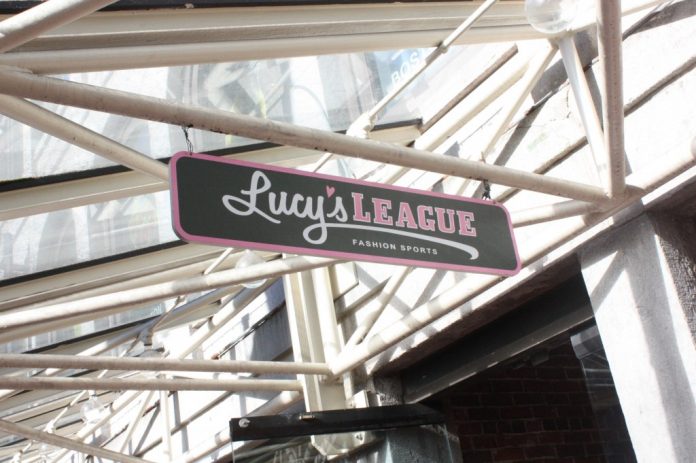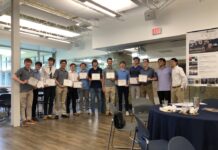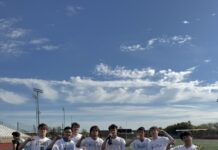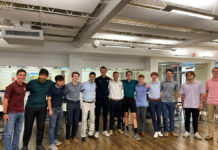The pen is mightier than the sword. At the most basic level, it has the ability to disseminate a message and convey thoughts and emotions. Today, the world of journalism is founded on the power of the written word. However, it is not as simple as it once was. With many subtle intricacies and nuances, it has become a complicated craft. To become more proficient in the craft of effectively delivering these messages, members of The Roundup, the school’s newspaper, and the Last Roundup, the school’s yearbook, went to Boston for a journalism convention hosted by the Journalism Education Association and the National Scholastic Press Association.
The two of us, Junior Roundup Editors Jackson Slaughter ’15 and Dominic Iannelli ’15, attended the trip, representing The Roundup at the 2013 Fall JEA/NSPA Journalism Convention. Here is our day-by-day journal log/account of our complete Boston experience:
WEDNESDAY:
Taking place over a course of four days, the trip started early Wednesday morning and ended on on midday Saturday, November 16th, at about 3:30 p.m. Arriving in Boston on Wednesday, the eighteen students on the trip and the two moderators, Mr. Michael Riemer, programming teacher and moderator of the yearbook, and Mrs. Valerie Souders, Jesuit English teacher, stayed in Cambridge, the town across the river from Boston and home to both MIT and Harvard. After a snack and unloading at the hotel, the group attended an exciting NBA Celtics vs. Bobcats game.
THURSDAY:
Slaughter- Team Storytelling: Grouped up with two other Jesuit students on the trip, Junior Chris Ayres and Senior William Dunkerley, I attended my first workshop “storytelling.” In this all-day workshop, the instructors described how to find a story, and then, each group went down to the center of Boston in search of an idea for a story, utilizing their newly learned skills. 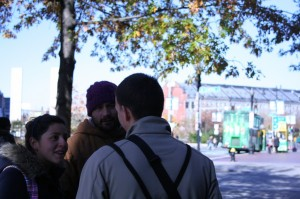 We conducted a survey of whether Bostonians are as patriotic as they claim. We walked around asking random individuals various questions about United States history. Once we got back to the convention center, we made graphs of the data, and I wrote a short article describing the activity.
We conducted a survey of whether Bostonians are as patriotic as they claim. We walked around asking random individuals various questions about United States history. Once we got back to the convention center, we made graphs of the data, and I wrote a short article describing the activity.
Iannelli- Team Storytelling: I worked alongside three other Jesuit students in describing three important recent events in Boston. We had to interview various pedestrians, write a short article on our findings, take photos, and design a template for the final project. It discussed the bombing at the Boston Marathon, the Boston Red Sox World Series Win, the Boston Strong movement, and how these affected the ordinary Boston citizen and in particular the sporting apparel stores. Throughout the day, I learned valuable lessons in interviewing, writing, and teamwork skills as we used the collaborative process of professional journalists.
After our Thursday workshops, we took the T train to Harvard Square, the site of Harvard University and a variety of shops, restaurants, and cafés.
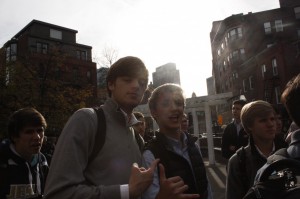 Later that night, we all reunited and ate dinner at John Harvard’s Pub before heading back to the hotel.
Later that night, we all reunited and ate dinner at John Harvard’s Pub before heading back to the hotel.
FRIDAY:
Iannelli – 14 in ’14 – Online Edition: This workshop taught 14 things that online news staffs should be doing in 2014. I brought back many tips to The Roundup, Jesuit’s all-digital publication. Some of the most important things were ways to attract more readers through visuals, shorter pieces, social media, different article types, commenting options, and analytics. By engaging readers in the webpage with these new ideas, hopefully the Roundup will be able to continue our upward trend in hits.
Iannelli – Break with a Pro – Sportswriting: In this session, I sat down with a small group of about eight other high school reporters to discuss sportswriting with a veteran in the field: Steve Krause, Sports Editor at The Daily Item in Lynn, Massachusetts. Having the opportunity to question and talk about sports journalism not only with a professional but also with students from other schools gave me insight into what The Roundup sportswriting staff is doing well and what we can improve on. Krause explained how we can get started in a career of journalism (one that I am currently considering) and how to go about the process of writing a sports piece. He told us how to inject real emotion into our sports pieces, beyond just the scores and stats.
Iannelli – Why Short Writing Works: As a writer, one of my flaws is my verbosity. I tend to write much too long and in way too much detail. This workshop aimed to fix that problem. I gained some valuable editing tips on how to shorten excessively long articles in the future. The instructor also gave us several games that we can play with the newspaper reporting staff to help us make our writing more clear and concise.
Both – Why Journalism Matters: The printed newspaper industry is sadly declining; however, this does not mean that journalism is dying as a whole, reiterated Jeff Howe, the instructor of the Why Journalism Matters session at JEA Boston 2013. A professor at Northeastern University, Mr. Howe gave us a deeper look inside the industry, and how journalism is actually growing as a profession rather than declining. He enumerated the various journalism careers that have actually arisen as a part of the digital age, and how digital publications are getting more views than ever before. It is not that people no longer want or need information; instead, it is that they are changing how they want to receive it. Mr. Howe completely changed my perspective of the journalism industry. The workshop also stressed both the history and the importance of journalism in modern day society. This was a particularly interesting session because the speaker was very interactive and funny. Relating the origins of journalism back to its modern day uses, the speaker stressed that it is extremely beneficial to society as it informs the common people about the world we live in. Overall, this session taught us the purpose of journalism and never to stray too far from its roots.
Slaughter – In “Dig a little, laugh a little,” two speakers stressed the importance of getting a good story. Although they made jokes and it was a well put together and funny presentation, there was little interaction. Also, I didn’t really hear anything new because The Roundup already taught me how to get a good story. However, it was still an enjoyable experience that at least taught me that there is a story in everything. You just have to dig a little.
After the workshops on Friday, we went down to North End where we were let loose and free to wander around Boston. Having spent a few hours, we all grouped up at a park that was right next to the train, and shortly returned to the hotel. We had dinner and went to a dance at the nearby Sheraton. The dance was a little crazy. The convention only expected 3,500 people to attend, but 5,500 showed up. Luckily, not all of them went to the dance. Due to the excessive amount of people, things quickly became crowded. We left just before midnight and got some needed sleep.
SATURDAY:
On Saturday, we were allowed a little extra sleep before going to the airport. I mostly slept on the plane, but all around, people were watching movies and discussing the trip.
Overall, this was a great trip that almost perfectly balanced fun with education. We feel as though we know more about journalism now than we previously ever did, and we had fun doing it! If given the opportunity again, we both would go without hesitation. In the Spring, JEA/NSPA will host another journalism conference, this one in San Diego, California. With the great success of the Boston trip, it is likely that both The Roundup and The Last Roundup will send another group of students to benefit from the educational convention. Until then, continue supporting these too great organizations!


